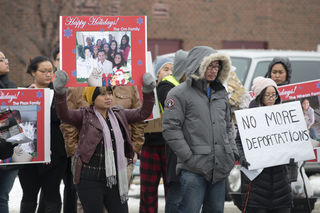Health
Asylum Seekers and Mental Health
Two psychiatrists explain the mental health risks that asylum seekers face.
Posted June 19, 2018

We are two psychiatrists who perform psychological evaluations of individuals seeking asylum in the United States. We recently saw a Central American woman who had fled gang violence, bringing her two surviving children with her; but only after her two eldest daughters had been murdered for refusing to become sex slaves. Another woman we recently evaluated had barely escaped her home in Eastern Europe after she was beaten and raped by skinheads who routinely target members of her ethnic minority. We have encountered many other women who escaped domestic violence of a similarly brutal nature. All of these individuals had sought help from police and local authorities, in vain.
According to international law long recognized by our courts, these people are refugees: They have fled their home country “because of persecution on account of race, religion, nationality, political opinion or membership in a particular social group;” and they must not be forced to return.
Abuse leaves scars. Perhaps not surprisingly, severe depression and Post-Traumatic Stress Disorder are extremely common among refugees. Our evaluations aid immigration authorities tasked with deciding the fate of refugee asylum applications, by documenting these psychological scars.
Last week, Attorney General Jeff Sessions announced that the U.S. will no longer recognize domestic abuse or gang violence as grounds for asylum. His decision has no basis in mental health or medical science. It is, transparently, a political tactic. For every person who flees violence to seek safety in the U.S., Sessions’ decision is tantamount to a death sentence.
Promoting health and well-being and protecting victims from further harm, these are clinical responsibilities based on moral imperatives. We ask our friends, our neighbors and our communities to consider that certain issues should not be decided on the basis of one’s politics: left vs. right, or liberal vs. conservative. The “issues” in this case are human beings: men and women, many carrying their children along with them in their flight. They have rights—and regardless of our politics, we have responsibilities.
by James Recht, M.D. and J. Wesley Boyd, M.D., Ph.D.
James Recht, M.D. is a Clinical Assistant Professor of Psychiatry at Harvard Medical School and a member of the Physicians for Human Rights Asylum Network.


